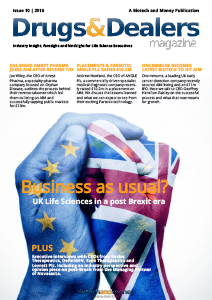Lawyers from a wide range of disciplines within Simmons & Simmons have identified the key potential issues that would impact upon business activities in the UK in the event of an out vote and continue to monitor events closely as they unfold. We can advise on the legal implications of a Brexit and the procedures that it would entail. We can also flag for clients the legal issues that would affect the way that the UK does business and how the different options for the UK’s future trading relationships could provide or limit opportunities. We are therefore in a position to advise on the major issues that the life sciences sector would face, and would need to plan for in the event of an out vote, both during the withdrawal negotiations and in the run up to an exit in order to be ready to do business in a possible post-EU environment.
This briefing note describes some potential issues for the life sciences sector to consider at this stage.
Issues for the life sciences sector:
- Regulation.
The life sciences sector is highly regulated. Nearlyall of this regulation, covering matters from clinical trial approval, pharmacoviligence, joint procurement of emergency measures (e.g. pandemic vaccines)to marketing authorisations and addressing the trade in falsified medicines, is harmonised at EU level. Should the UK leave the EU it is not clear to what extent these EU regulations would still apply to the UK and to what extent the UK would be party to measures which require inter-member state cooperation. These matters will all be up for negotiation and political decision.
. - Growing Business.
There is likely to be a change, post-Brexit, in the behaviour of investors in the life sciences sector. Many firms and investors invest in the UK because it offers unrestricted access to domestic and EU markets; however, this would not be the case if the UK were to leave the EU. Investors may prefer to invest in companies based within the EU in order to access the other member states. Alternatively, the exit of the UK from the EU could have a destabilising effect on the EU markets and cause foreign investors to invest in markets outside of Europe completely.
Brexit could also have a destabilising effect on the London Stock Exchange (LSE). This could potentially make listing on the LSE less attractive; the LSE may no longer be a sought after exchange to announce initial public offerings (IPOs).
If the UK were to leave the EU, many substantial mergers would potentially be subject to two systems of merger control in parallel: thus, vetting by both the UK Competition and Markets Authority (CMA) and the European Commission.
. - Employees
Exiting the EU would mean that free movementof workers between the UK and the other EU member states would come to an end. This would undoubtedly impact the movement of scientists, life sciences companies’ staff and researchers across Europe. It also poses questions regarding the status of EU citizens currently employed in the UK in the life sciences sector.
. - R&D
The potential exit from the EU by the UK could have serious implications for clinical trials. Thenew Clinical Trials Regulation which is due to take effect this year will introduce a single portal for submitting applications to begin clinical trials inthe EU, along with a new EU-wide trials database and requirements for disclosure of trial data. This Regulation would not apply to the UK post-Brexit and this raises questions about how clinical trials that have a UK-EU cross-border dimension willbe approved and run; the UK may become a less attractive location for clinical trials. Furthermore, data protection issues would arise around the transfer of clinical data between the UK and the EU.
The UK is a net recipient of EU funding for R&D programmes. If Brexit were to occur then the funding available to UK-based research companies will probably decrease.
If the UK were to leave the EU, R&D collaboration agreements would likely fall within separately applied and potentially diverging competition regimes in the UK and the EU. Similar issues as those raised in relation to clinical trials with regards to transfer of data cross-border would also arise in relation to collaboration agreements.
. - Marketing Authorisation
Supplementary Protection Certificates are currently governed by an EU Regulation, which will no longer apply if the UK leaves the EU. The UK government will have to decide whether and how to replace this Regulation.
If the UK chooses to operate its own authorisation system, the workload of the Medicines & Healthcare Products Regulatory Agency (MHRA) will increase, as it inherits work from the EMA. Furthermore, the EMA is currently situated in London and Brexit will require the EMA to relocate to an EU member state. The recruitment and training of additional staff by both institutions is likely, in the short term, to reduce the efficiency with which authorisation applications are processed. - Intellectual Property
If the UK leaves the EU, it will not be permittedto participate in the Unified Patent Court whichis due to open next year, and the new unitary patent will not cover the UK. Ratification of the UPC Agreement is likely to be delayed. The London branch of the Central Division would need to relocate, probably to Italy.
Supplementary Protection Certificates are currently governed by an EU Regulation, which will no longer apply if the UK leaves the EU. The UK government will have to decide whether and how to replace this Regulation. - Manufacturing and Supply Chain
There are no tariffs for drug products, API and many chemical intermediates between most developed countries. For other products, and for countries where there are tariffs on pharmaceutical products, it is not clear whether the UK will obtain as good terms of trade as the EU has negotiated.
If the UK negotiates access to the single market, there is likely nevertheless to be customs checks at the border (as is the case for Norway) – in effect, a “paperwork” border.
Those responsible for manufacturing and the supply chain will need to take account of these changed circumstances after a Brexit.
At present there are uniform safety standards across the EU in relation to the manufacture of pharmaceutical products and medical devices. It is likely, post-Brexit, that UK rules in this area will diverge from continuing EU legislation, giving rise to compliance issues for companies wishing to export to the EU from the UK.
Authors: Mark Curtis, Partner, Rowan Freeland, Partner, Charles Bankes, Partner, Charles Mayo, Partner, Tony Woodgate, Partner, Jocelyn Ormond, Partner, Jacques-Antoine Robert, Partner, Vicky Wickremeratne, Partner & Michael Gavey, Partner
Source: Simmons & Simmons
Copyright Simmons & Simmons LLP 2016
BREXIT WEBINAR
Find out what an out vote wouldreallymean for the UK life science sector.
Join a panel of industry stakeholders, including:
Date:Tuesday 21st June 2016
Time:16.30 BST
Duration:1 hour
The panel will providea balanced debate on the pros and consin different areas.
Research & Talent:
- Would there really be an exodus of the best international scientific talent from the UK and where would this talent be likely to move to?
- How important would a loss of coordination roles in EU collaborations be? How would this affect sciences revenues?
- How much research funding could the UK lose out on?
Regulation:
- With the European Medicines Agency forced to leave London in an out-vote, what extent would Britain’srole in regulating medicine be diminished if Britain were to leave the EU?
- What could the regulatory environment the UK medicines look like post-Brexit?
Investment:
- In what ways would Brexit threaten inward investment into UK life sciences?
- Could restoring full sovereignty enable the UK to re-strategise and become more pro-science?
- How will investors react in terms of funding, finance and investment?
- How much of the £9bnEUbudget contribution could and should be earmarked for science in case of an out vote?
Future:
- What can life science companies do to cope with the uncertainty of Brexit?
- How should companies be preparing for the eventuality of an exit?
Can't make it? Register anyway and we will email you the recording to watch on-demand as soon as it is available.

















Add Your Response